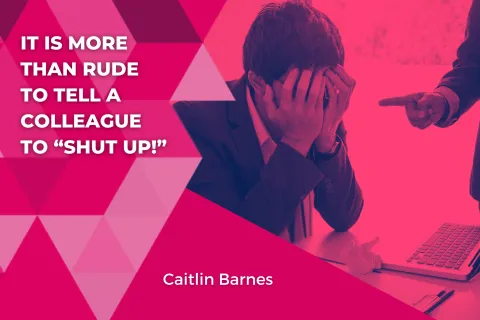Language in a workplace is more important than ever, as a case where a colleague was told to “shut up” contributed to a successful claim for constructive unfair dismissal.
Case Overview: Glasgow Employment Tribunal Ruling
In June 2025, the Glasgow Employment Tribunal ruled that David Ashe, the former Director of Operations, was justified in his claim for constructive unfair dismissal against his managing director, Roger Topping, at Claims Equilibrium Club (CEC).
Mr Ashe was approached and entered discussions with Mr Topping, resulting in an offer of employment being made. This was titled “Employment and then Equity Ownership of CEC.” It was confirmed that Mr. Ashe would assume the position of Director of the company from April 1, 2022, and would acquire 50% of the company’s share capital.
Challenges and Disputes
While Ashe’s first year at CEC ran relatively smoothly, tensions grew in the second year. Topping expressed concerns that Ashe was not building broker relationships due to having been out of the country for several years. Multiple broker meetings brought in no new business, and Ashe criticised Topping for being “stuck in his ways” and failing to provide adequate work or oversight.
The equity sale became another turning point. Although initially promised 50% ownership within five years, Ashe was later offered the entire company, which he declined. Topping said expansion was necessary and criticised Ashe’s “disappointingly low” fee earnings. He proposed that Ashe could remain in a reduced role doing support adjuster work on a fixed salary but admitted there was no prospect of the planned partnership going ahead.
Grievance and Resignation
In Jue 2024, Ashe raised a grievance, citing the removal of the equity agreement, which had been a key factor in his decision to join CEC, and alleging that the original proposal document was misleading. He also claimed his contract had been altered to absorb his car allowance into his salary, complained of bullying and intimidation, and pointed to fortnightly staff meetings where Topping had shouted at him to “shut up”. Topping did not deny the comment, and an HR consultant was brought in. The grievance was partially upheld, but Ashe maintained that it had not been handled properly. Ultimately, he felt he had no choice but to resign.
Tribunal Outcome: Language Matters
Employment Judge, Lucy Wiseman ruled that “Mr Topping did not have reasonable and proper cause to tell a fellow director to ‘shut up’ during a staff meeting and in front of other, more junior, staff.” It was concluded that this interaction was not “common parlance” as Mr Topping argued, but rather public undermining that a reasonable person could not be expected to tolerate.
The tribunal awarded Ashe £14,568 in compensation, inclusive of a 50% reduction to the compensatory award, due to the claimant’s part in the breakdown of the relationship between himself and Mr Topping.
As this was an Employment Tribunal decision, it does not set a binding precedent for other tribunals. However, it is a useful example of how tribunals may assess the impact of language and behaviour in the workplace.
Context of the Ruling: A Shift in Standards
The ruling in the case of Mr. D. Ashe v. Claims Equilibrium Club Ltd is part of a line of Employment Tribunal cases considering what amounts to unacceptable conduct in the workplace. While each case is fact-specific, the trend shows tribunals taking a stricter approach to language that undermines respect and dignity at work. Employers and employees should therefore treat this as persuasive guidance.
Advice for Employees: Promoting Workplace Respect
Language matters and maintaining a mutual respect in the workplace is not just good practice; it is a legal requirement. Here are some key takeaways for employees:
Address Unreasonable Behaviour:
If you feel you are being spoken to unreasonably or disrespectfully, you have every right to address it. No employee should feel undermined by a colleague or an employer.
Encourage Professional Culture:
An employer should create a culture where professionalism is the norm, and “common parlance” is not an excuse for poor behaviour. Respect should be evident not only in formal policies but in everyday interactions, including the subtle exchanges that shape workplace culture.
Raise Grievances When Necessary:
If boundaries are crossed, especially in ways that affect your dignity or your ability to do your job, you should feel empowered to raise a grievance.
Promote Mutual Respect:
Employees carry a responsibility to communicate in a way that is professional, respectful, and unlikely to be misunderstood. Respect goes two ways, and upholding it benefits everyone.
Addressing Workplace Disputes and Legal Rights
If you are facing workplace disputes, seeking advice on constructive dismissal, or need assistance regarding employee legal rights and applicable laws, our experienced employment law team is here to support you. We understand the complexities of workplace issues and are committed to providing you with the guidance you need.
For more information and assistance, please contact us at 0141 221 1919.






